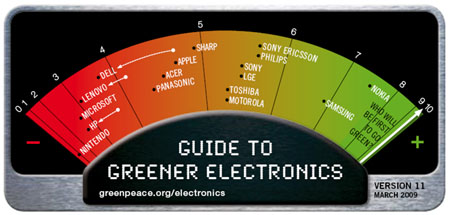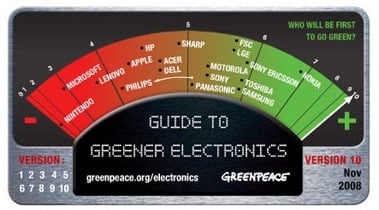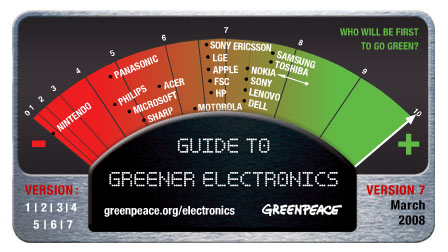This article is more than 1 year old
PC firms slammed in latest Greenpeace eco report
Nokia triumphs, Nintendo stuck in the mire
Dell, HP and Lenovo have all seen their eco-friendliness scores slashed in the latest edition of Greenpeace’s Guide to Greener Electronics, which conversely saw Apple and Philips gain notable mentions from the environmental organisation.

Greenpeace's latest eco assessment of top tech firms
The guide – now on its eleventh edition - ranks 17 leading electronics firms according to Greenpeace's own energy, e-waste and toxic chemical criteria. For example, use of Earth-damaging substances in products will get you a low score, while using solar energy to power PCs will get you higher marks.
Dell’s score crashed from 4.7 points – out of as possible ten - in the previous release of the report, to 3.7 this time around. HP’s points fell from 4.5 to just 2.7, while Lenovo slipped from 3.7 to 3.1 points.
All three firms experienced drops because of negative changes made to their timetables for the elimination of PVC and BFRs. For example, HP admitted it wouldn’t meet its 2009 deadline, and Lenovo pushed its promised phase-out forward from this year to next.
Philips is the report’s real star, though. It moved from fifteenth place in the last version of the report – when it scored 4.1 points – to fourth place with a score of 5.7 points.
The firm’s surprise rise is partly due to its commitment to eliminate “all phthalates and antimony” from products by late next year.
But Philips must still provide examples of PVC and BFR-free products, Greenpeace said, and come clean about its use of recycled plastics – if it uses them at all.

Greenpeace's previous report scores
Nokia took the top spot in Greenpeace’s report, once again. Its score rose from 6.9 to 7.5 points.
Greenpeace said Nokia scored well partly because the company is committed to reducing CO2 emissions by 18 per cent by 2010. However, Greenpeace said the Finnish phone maker needs to start using recycled plastics in more than just its packaging.
Samsung rose from fourth to second place by upping its score from 5.9 to 6.9 points. Sony Ericsson (SE) dropped from second to third place, with its score dipping slightly from 5.9 to 5.7 points.
Samsung gained two positions partially because all its new LCD panels are free of PVC, Greenpeace said. SE fell foul of the body’s criteria for use of recycled plastic content and for the amounts of renewable energy used in production.
However, the eco body praised SE for being “the first company to score almost top marks on the chemicals criteria”.
Apple saw its score rise, albeit slightly, from 4.3 in the previous report to 4.7 points this time around.
Ensuring that all its products are now free of PVC and BFRs put Apple in Greenpeace’s good books. But the firm could have done better by eliminating PVC from its power cords – something that’s in the process of being certified, Greenpeace noted.
Apple should be commended for advertising the green credentials of its MacBooks, Greenpeace stressed. Earlier this year, the body heaped praise on the MacBook Air's eco-friendliness.

Tech firms' eco progress this time last year
Motorola and Sharp’s latest scores – 5.3 and 4.9, respectively – came after moderate drops.
The higher-ranking LG and Toshiba both saw their scores drop - from 5.7 to 5.5 points and from 5.9 to 5.3 points, respectively.
Microsoft rose from second to last place to third from last, that’s despite its score falling from 2.9 to 2.7.
Nintendo could be left looking a little red faced, though. Although it didn’t do any worse, in terms of points, the gaming giant once more came in dead last with just 0.8 points.
The full version of Greenpeace’s Guide to Greener Electronics version 11 is available online. ®
